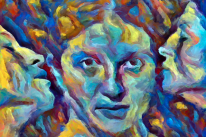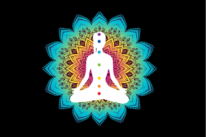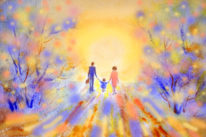
“Be what you are. This is the first step toward becoming better than you are.” ~Julius Charles Hare
In a few months it will be the two and a half year anniversary of my mental breakdown.
I don’t really celebrate the date, partially because I don’t know it—it’s not the sort of thing that you remember to mark on your calendar—and partially because my entire life since then has been a celebration of what I began to learn that night.
I began to learn about myself.
It’s been a wild ride of healing, helplessness, forgetting, and remembering. Many times, I felt like giving up and running back to drugs and alcohol, but I didn’t.
Many times, I felt like bottling my emotions or lashing them out onto the closest victim, but I didn’t. Many times, I felt disgusted by my reflection and compelled to stop eating again, just for a day or two, so I could feel the sick freedom of an empty stomach, but I didn’t.
I guess after you almost kill yourself, you just can’t go back to being the way you were. There’s something in your mind that says, “No, that didn’t work for ten years, and it won’t work now.”
Honestly, self-awareness saved my life, and I have no doubt that this simple, consistent practice is as essential as exercising and eating well. I like to dream sometimes about what the world would look like if we all committed to knowing ourselves, and it’s beautiful. It really is. We’re beautiful.
Without further ado, here are five life lessons I’ve learned from two years of healing my mind and reconnecting with myself.
1. Self-awareness is self-love.
About two weeks after I broke down, I was flipping through stacks of old journals, feverishly looking for patterns. What I found amazed me: epiphany after epiphany that I needed to love myself, to be my own best friend, to treat myself better.
Those epiphanies never translated into action until I was forced to look at my reflection, raw and real. When I saw her, I loved her immediately.
You cannot love someone you don’t know. In the end, that’s why so many people in our society don’t love themselves, or each other. Not because they don’t try, but because they don’t know themselves.
Once you find who you are—who you really are—self-love is not an option. And neither is unconditional human love, for that matter, because once you find that spark of magic inside of you that makes your heart beat, you find that magic in all of us.
2. Believing all your thoughts is a dangerous thing.
I used to believe everything I thought. For a while, my thoughts told me that I was fat and ugly. Believing them destroyed my confidence. Then, my thoughts told me I needed drugs, alcohol, and cigarettes. Believing them destroyed my body.
One day, my thoughts told me to kill myself. Believing them was almost the last thing I ever did.
As human beings, we have this amazing capacity to conceptualize, analyze, and create stories in our heads. That capacity can be used to build spaceships and save the world. That same capacity can be used to harm ourselves and others.
It’s not that I don’t think toxic thoughts anymore. Sometimes, I still get anxious, fearful, and insecure thoughts just like anyone else. The difference is that I constantly observe and question what I think.
I make choices about what I believe is true. And that makes all the difference.
3. There is no quick fix (and you don’t want one anyway).
When I was in elementary school, I tried praying for a few months. I wasn’t sure if God existed, but I was willing to give it a try.
I said, “Dear God, please make me wake up tomorrow having lost forty pounds, with no pimples, and my stretch marks disappeared. If you do, I’ll start going to church. Okay, thanks. I mean… Amen.”
Needless to say, it never happened. About fifteen years later, I’m telling this story to someone and they point out how, if that did happen, my life would have been much worse. Showing up to school suddenly forty pounds lighter is a sure-fire one-day ticket to being a “Freak” (much faster than just being forty pounds overweight).
I was amazed. How could I not have seen this?
Now I know; back then, I only wanted a quick fix because I wasn’t doing anything about my problems. We only crave miraculous, effortless change when we’re not helping real change happen.
I used to tell myself stories about how I didn’t want to change because it would hurt too much. Honestly, healing has hurt more than I can possibly relate, but you know what? It’s not the same pain.
The pain of enduring obstacles on a path that you’ve decided to walk is absolutely nothing like the pain of being trapped in a situation you have no plan to escape. Nothing hurts like helplessness and stagnation. That’s what we actually don’t want.
4. People who adored your mask probably won’t like your authentic self.
This just baffled me when it first happened. When I was self-destructive, rude, jaded, and fake, people couldn’t get enough. When I showed my vulnerable, inspiration-hungry, sparkly-eyed self, most of those same people recoiled in horror.
My first months of healing, I spent alone in an empty room watching TED talk after TED talk eating chocolate chips right out of the bag. I was alone, but somehow, I wasn’t lonely anymore.
Nothing is lonelier than being with people who don’t understand you. Those who love a person in a mask are wearing their own masks. They’re putting on a play for everyone to see—terrified of who they are underneath.
A person who chooses to be authentic around the masked will always be rejected, because the masked reject that part of themselves.
Don’t worry. There are authentic, open, loving people waiting to meet someone just like you in your raw, vulnerable state. They’re just waiting for you to get off that stage.
5. You are the world’s foremost expert on yourself.
For a long time, I was looking for someone to tell me exactly what to do. I’d read a book and it would have an inspiring idea, but then the implications of that idea would make me feel uncomfortable. Still, I’d try it on. After months of struggling, I realized it just wouldn’t fit.
This happened again and again.
I thought there was something wrong with me because other people’s frameworks didn’t fit me like a glove. It wasn’t until I started helping other people that I realized, they’re not supposed to.
Other people’s words can inspire us, inform us, and, at best, give us valuable frameworks within which to place our experiences. But how we fill in those gaps and connect those dots—that’s still up to us.
Self-discovery is supposed to be messy and confusing. You’re supposed to feel like no one has the answers for you, because they don’t. You have the answers. At most, you need a guide to help you find those answers, and even then, you always have the final say.
—
These five lessons all came to me as epiphanies at first, but I never stop learning them. These truths continue to come to me in different words and different forms, as I apply them to myself and others, as I forget them just to remember them again and again.
It’s not always sunshine and rainbows, but I always know there’s a way out of any darkness and I know that, even if I forget, everything is going to be okay. And that makes it all worth it.
Woman in Tree Position image via Shutterstock
About Vironika Tugaleva
Vironika Tugaleva (also known as Vironika Wilde) is a poet, spoken word artist, activist, and award-winning author. Vironika believes in the medicinal power of honest words and tough truths. When Vironika isn't writing, she loves stargazing, singing, and eating pickles (sometimes, all at once). You’re welcome to follow her on Instagram (@vironikawilde), check out her latest book, Love & Gaslight, or get a free preview of The Art of Talking to Yourself.
- Web |
- More Posts













 Though I run this site, it is not mine. It's ours. It's not about me. It's about us. Your stories and your wisdom are just as meaningful as mine.
Though I run this site, it is not mine. It's ours. It's not about me. It's about us. Your stories and your wisdom are just as meaningful as mine. 